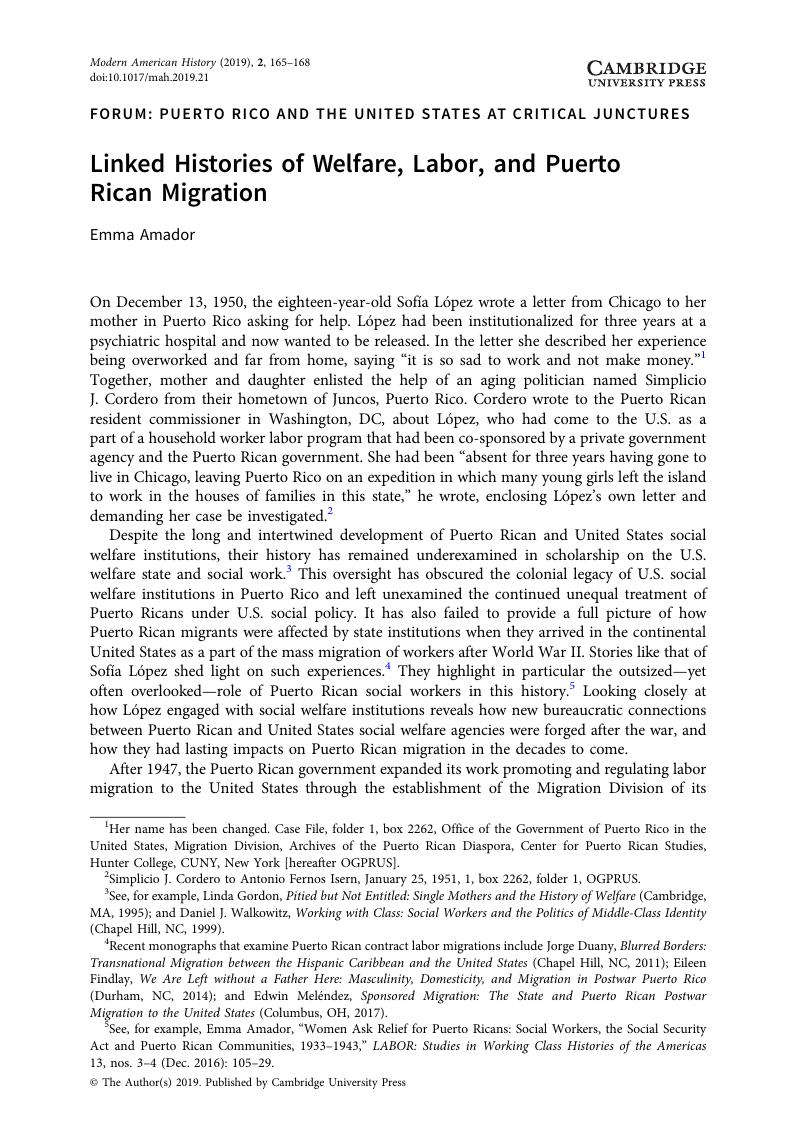Published online by Cambridge University Press: 02 August 2019

1 Her name has been changed. Case File, folder 1, box 2262, Office of the Government of Puerto Rico in the United States, Migration Division, Archives of the Puerto Rican Diaspora, Center for Puerto Rican Studies, Hunter College, CUNY, New York [hereafter OGPRUS].
2 Simplicio J. Cordero to Antonio Fernos Isern, January 25, 1951, 1, box 2262, folder 1, OGPRUS.
3 See, for example, Gordon, Linda, Pitied but Not Entitled: Single Mothers and the History of Welfare (Cambridge, MA, 1995)Google Scholar; and Walkowitz, Daniel J., Working with Class: Social Workers and the Politics of Middle-Class Identity (Chapel Hill, NC, 1999)Google Scholar.
4 Recent monographs that examine Puerto Rican contract labor migrations include Duany, Jorge, Blurred Borders: Transnational Migration between the Hispanic Caribbean and the United States (Chapel Hill, NC, 2011)CrossRefGoogle Scholar; Findlay, Eileen, We Are Left without a Father Here: Masculinity, Domesticity, and Migration in Postwar Puerto Rico (Durham, NC, 2014)CrossRefGoogle Scholar; and Meléndez, Edwin, Sponsored Migration: The State and Puerto Rican Postwar Migration to the United States (Columbus, OH, 2017)Google Scholar.
5 See, for example, Amador, Emma, “Women Ask Relief for Puerto Ricans: Social Workers, the Social Security Act and Puerto Rican Communities, 1933–1943,” LABOR: Studies in Working Class Histories of the Americas 13, nos. 3–4 (Dec. 2016): 105–29Google Scholar.
6 On social work in Puerto Rico, see Ortiz, Nilsa Burgos, Pioneras de la profesión de trabajo social en Puerto Rico (Hato Rey, PR, 1997)Google Scholar.
7 On Puerto Ricans in Chicago, see Ramos-Zayas, Ana, National Performances: The Politics of Class, Race, and Space in Puerto Rican Chicago (Chicago, 2003)Google Scholar; Rúa, Mérida M., A Grounded Identidad: Making New Lives in Chicago's Puerto Rican Neighborhoods (Oxford, UK, 2012)CrossRefGoogle Scholar; and Fernández, Lilia, Brown in the Windy City: Mexicans and Puerto Ricans in Postwar Chicago (Chicago, 2012)CrossRefGoogle Scholar.
8 Rúa, A Grounded Identidad, 22–23.
9 E. F. Dombrowski to Government of Puerto Rico, Department of Labor, May 3, 1951, box 2262, folder 1, OGPRUS.
10 For one example in Latinx history, see Miroslava Chávez-García, States of Delinquency: Race and Science in the Making of California's Juvenile Justice System (Berkeley, CA, 2012).
11 See Rúa, A Grounded Identidad, 21–3; Toro-Morn, Maura I., “Género, trabajo, y migración: Las empleadas domésticas puertorriqueñas en Chicago,” Revista de Ciencias Sociales 7 (June 1999): 102–25Google Scholar; and Amador, Emma, “Organizing Puerto Rican Domestics: Resistance and Household Labor Reform in the Puerto Rican Diaspora after 1930,” International Labor and Working-Class History 88 (Fall 2015): 67–86CrossRefGoogle Scholar.
12 Joseph Monserrate, “Puerto Rican Culture (Talk),” 1954, folder 1, box 1, Ana Ramos-Zayas Collection, Archives of the Puerto Rican Diaspora, Center for Puerto Rican Studies.